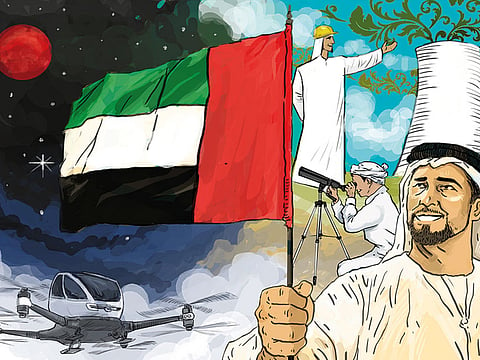In the UAE, the future begins now
From Mars mission to autonomous vehicles, the country has been embracing new ideas and technology to forge ahead

‘One thing you can’t accuse the United Arab Emirates of lacking is vision.” This was how a BBC report summarised UAE efforts to plan for the future. The BBC report, published early this month, came close on the heels of UAE’s new initiatives to promote research on the possibility of cultivating date palm and lettuce on the planet Mars. These moves were part of UAE plans to explore the red planet with the help of a research probe launched from Japan. The UAE probe, named Hope (Amal in Arabic) will head to Mars in 2020.
These goals may seem to very ambitious, but they are very much a part of UAE plans for the post-oil era, envisioned under the leadership of His Highness Shaikh Mohammad Bin Zayed Al Nahyan, Crown Prince of Abu Dhabi and Deputy Supreme Commander of the UAE Armed Forces.
On the 46th anniversary of its inception, the UAE is looking boldly towards the future with plenty of plans, strategies and vision that will build on the successes achieved over the years. One of the critical areas of focus has been to utilise the country’s natural resources for the benefit of people.
In 2015, Shaikh Mohammad Bin Zayed spelt out the future course of the nation. Addressing the Government Summit in Dubai, he said: “If we are making a good investment today, I bet we would celebrate exporting the last barrel of oil 50 years from now.” That was the clarion call to prepare for the challenges of a post-oil economy, an economy that would tap several avenues of income. In early 2016, an extended ministerial meeting chaired by His Highness Shaikh Mohammad Bin Rashid Al Maktoum, Vice-President and Prime Minister of the UAE and Ruler of Dubai, explored ways to diversify the economy sustainably. During the meeting, Shaikh Mohammad Bin Rashid emphasised the importance of investing in human resources which he said was the “global currency of the economies of the 21st century”. That’s the only way to address future challenges and present a positive image of the UAE to the world, he added.
The UAE’s moves to plan for the post-oil economy is a natural response to the developments around the world and the fourth industrial revolution. There is a pressing need to alleviate pressure on public budgets affected by declining global oil prices in recent years, especially after crude prices went into a free fall from $120 (Dh440.4) per barrel in 2014. Although there has been some recovery due to the strident efforts of the Opec (Oil and Petroleum exporting countries), it unlikely that oil prices will scale those peaks again soon.
There is no doubt that the UAE has seized a great opportunity that would help it systematically transition into a diversified economy based on innovation and knowledge. We want to become a developed nation in terms of economic growth and maintain the highest levels of welfare and prosperity. We also must keep up with the economic, financial, technological and social developments of the future in sustainable and innovative ways. All efforts and resources have been geared towards achieving that goal. Take education, for example. The UAE spends more than 4 per cent of the GDP on education — the highest in the Middle East. This has resulted in rising attendances in secondary schools and a soaring high literacy rate. Another factor that aids in UAE’s march towards more progress is the fact that a majority of the population are youth. That gives the country ample potential youth workforce to continue its sustained bid to keep pace with technological advancements.
Core areas
The UAE has invested heavily in transforming into a knowledge economy. And the efforts are showing as the UAE headed the list of the countries of the future in 2015/2016 in the Middle East and North Africa and the 41st in the World Bank’s knowledge index from 145 countries.
Renewable energy is one of the core areas: A major plan valued at $82 billion is at the heart of the venture. A peaceful nuclear programme is another one: The nuclear power plants will care of about 25 per cent of the electricity demand by 2020. With electricity being an integral part of industrial growth, the nuclear facilities will provide continuous, reliable power to meet the requirements without the ill-effects of carbon dioxide emissions. The UAE has been quick to hitch its future to the Fourth Industrial Revolution (4IR). Early this month, the government in partnership with the World Economic Forum launched the 4IR Protocol. The initiative will help establish a regulatory framework for the tools and technologies that drive the next wave of human progress. The UAE Centre for Future Readiness will develop programmes and policies that help prepare government agencies for the challenges of the Fourth Industrial Revolution.
The government has committed to implement a range of strategies in areas such as autonomous vehicles and 3D printing. Nothing seems beyond imagination when the country is ready to embrace the future. In the UAE, the future starts now. And the efforts to meet those challenges have already begun.
Dr Salem Al Ketbi is an Emirati political analyst, researcher and opinion writer.



